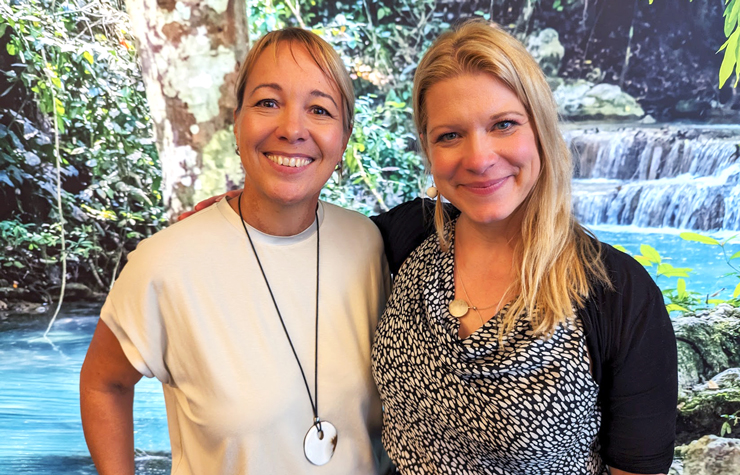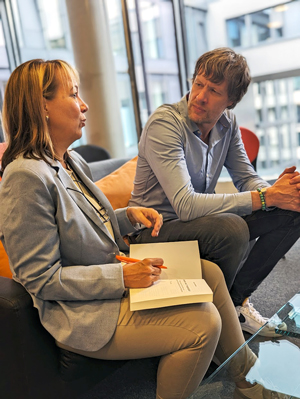A behind-the-scenes look at a Philippine hospital: a field report on the indispensable "Watcher System".
Imagine you are travelling, perhaps in Asia, perhaps on one of the many beautiful islands of the Philippines. Dream beaches, fantastic underwater world, hospitable inhabitants - and then suddenly you get sick! And seriously! You have to go to hospital.
Hello, I am Sonja Schlenther and I have been living and working in the Philippines for 18 years. During this time I have got to know the country, the culture and the health system intensively.
I originally designed, built and managed my own boutique hotel for over a decade before selling it in 2016. Since then, I have mainly dedicated myself to building and renting out houses and flats, as well as advising people who want to start a new existence abroad, especially in the Philippines.
On the side, I act as a mentor, author and speaker in German-speaking countries. My personal mission is to inspire other people to pursue their professional and personal dreams, perhaps "off the beaten path", to lead a self-determined and free life.
Today I want to tell you about the typical Filipino "watcher system" and how I went to the Philippine hospital to inquire about the general health system in the Philippines. There were some surprising aspects.
A few facts and figures about the Philippine health system
First of all, some basic information about the Philippine health system. Basically, there are public and private hospitals in the Philippines, with the private hospitals predominating with about 60 per cent. Basic medical care is guaranteed by law for all citizens. However, in an emerging country with around 114 million inhabitants, about half of whom live in rural areas, the challenge is to make medical services accessible and affordable throughout the country.
Currently, the contribution rate for employees with a daily minimum wage is 400 PHP (about 6.66 Euros), i.e. for a monthly wage of 160 Euros on average: 400 PHP = 6.66 Euros. Interestingly, in addition, each Filipino invests an average of about 160 euros a year in health-related goods and services. Consultation fees at the doctor's vary between six and eight euros, reflecting the type of medical care. Private clinics charge slightly more at 10 to 16 euros. For hospital stays, room costs (private rooms) range from 25 to 180 euros per day, depending on the patient's financial means and needs.
 Sonja and Anne in July in the BDAE offices
Sonja and Anne in July in the BDAE offices
„Do you have a watcher?”
Back to the initial situation: You end up as a patient in a Philippine hospital. Apart from the fact that most hospitals on the small islands do not meet European standards (big cities have good standards, though), you are lucky enough to get a private single room (for an extra charge, of course, if your health insurance does not cover it). Unfortunately, you have to spend several days in hospital and are travelling alone. Then the hospital staff kindly ask you: "Do you have a watcher?". A what? A "watcher" or "overseer"? What on earth is that? You may think to yourself, you know the TV series The Watcher (nice main character), but you need your own Watcher. Where to get it if not to steal it? The staff patiently explain to you that you need a Watcher in a Philippine hospital. I call this an "all-around person". This person should not only "watch over" you during the day. He or she is also responsible in emergencies, because the red emergency buttons at the bedside are usually not there. The watcher then also takes over this emergency service! 24 hours and seven days a week!
The watcher also makes sure that the medicines that the medical team writes down for you are obtained from a pharmacy (hopefully they are in stock and not "out of stock"). In addition, the watcher is usually also the entertainment programme. This is because in many hospitals there is no wi-fi or its availability is very limited. The same applies to television. Filipinos bring their entertainment programme with them from home! Friends, acquaintances, but mainly family members take care of the sick person and also stay overnight in the hospital! Sometimes there is an extra bed (private hospitals), sometimes only a couch, often the floor with a simple mat has to do. In any case, the watcher is essential and an integral part of Philippine (hospital) culture!
The "watcher system" surprised me a lot and shows the strong differences between our health care system in the DACH region and an emerging country like the Philippines.
I had to make an important decision for my surgery
I would like to share another experience regarding the "Watcher System" with you, namely my own: In the middle of 2022, I had a massive slipped disc and I could not avoid having it surgically treated. As my primary residence is on a small island called Camiguin Island, I went to the second largest city in the Philippines Cebu City to research what options might be available to me. The consultation with a surgeon and back specialist recommended by acquaintances was not only detailed, informative and very friendly. He also explained to me in detail the possible surgery and treatments. In itself, the consultation, which only cost about ten euros for an hour, made a good initial impression on me. However, the surgery costs of more than 12,000 US dollars seemed very high for an emerging country like the Philippines.
 Sonja during her BDAE visit in July. BDAE employee Thorsten listens attentively to Sonja as she reports on her experiences with the Philippine health system.When I asked how long I would have to stay in hospital after the operation, the doctor said it would be about a week. In the same breath, he asked me about my "watcher", for whom there was to be a separate bed in my private room. That was my first encounter with the "watcher system". The nice surgeon told me to please choose a companion of my choice and bring her with me. Aha! That was a big problem for me, because at that time I couldn't think of a suitable person who would simply have time to look after me in hospital for a week. Also, I would have had to bring this person (at my expense) from Camiguin Island, because I didn't know anyone for this task in the big city of Cebu-City.
Sonja during her BDAE visit in July. BDAE employee Thorsten listens attentively to Sonja as she reports on her experiences with the Philippine health system.When I asked how long I would have to stay in hospital after the operation, the doctor said it would be about a week. In the same breath, he asked me about my "watcher", for whom there was to be a separate bed in my private room. That was my first encounter with the "watcher system". The nice surgeon told me to please choose a companion of my choice and bring her with me. Aha! That was a big problem for me, because at that time I couldn't think of a suitable person who would simply have time to look after me in hospital for a week. Also, I would have had to bring this person (at my expense) from Camiguin Island, because I didn't know anyone for this task in the big city of Cebu-City.
This surprising "watcher aspect" brought a great malaise to my already battered condition. I then consulted my German doctor, my family in Karlsruhe and the BDAE. I decided to have the necessary operation in my home town of Karlsruhe because of the very high costs of the operation and because I could not find a suitable watcher.
My lesson: We need the power of the community
Despite the surprise and unusualness of the Watcher system, this was a valuable lesson for me: we need the power of community and the importance of supporting each other, especially in difficult times. This experience has encouraged me to continue my own mission of supporting and encouraging others. It is in this spirit that I would like to conclude my contribution. Thank you for allowing me to share my experience and I hope that it will help to broaden awareness of the valuable lessons we can learn from different cultures.

